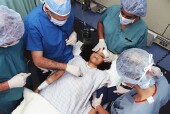
TUESDAY, Feb. 11, 2014 (HealthDay News) — Experimental glasses that seem to improve a doctor’s ability to see cancer cells during surgery may help reduce cancer patients’ need for follow-up operations, according to a new study.
The researchers said that cancer cells can be extremely hard to see, even under high-powered magnification. When viewed through this new high-tech eyewear, cancer cells glow blue and are apparently easier to distinguish from healthy cells. This means stray tumors are less likely to be left behind after surgery, the researchers said.
The new system was developed by a team at Washington University School of Medicine in St. Louis that was led by Samuel Achilefu, a professor of radiology and biomedical engineering. Dr. Julie Margenthaler, a breast surgeon and associate professor of surgery at the university, was the first to use the technology during surgery, on Monday.
“We’re in the early stages of this technology, and more development and testing will be done, but we’re certainly encouraged by the potential benefits to patients,” she said in a university news release.
Margenthaler said that 20 percent to 25 percent of breast cancer patients who have lumps removed require a second operation because of current technology’s inability to spot all cancer cells.
“Our hope is that this new technology will reduce or ideally eliminate the need for a second surgery,” Margenthaler said.
The technology includes custom video technology, a head-mounted display and a chemical that attaches to cancer cells and makes them glow when viewed with the glasses. The glasses can detect tumors as small as 1 millimeter in diameter (the thickness of about 10 sheets of paper), according to the study, published in the Journal of Biomedical Optics.
Achilefu has filed a patent for the technology. The research was funded by the U.S. National Cancer Institute, the news release said.
More information
The American Cancer Society has more about cancer surgery.
Copyright © 2026 HealthDay. All rights reserved.

